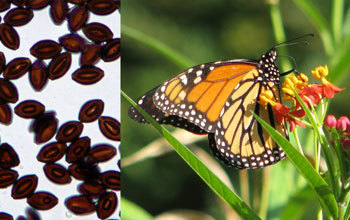Monarch butterflies carry infections in parts of the U.S. where they breed year-round. Image: P. Dav
Monarch butterflies carry infections in parts of the U.S. where they breed year-round. Image: P. Davis and S. AltizerInfectious diseases and climate change intersect with no simple answersClimate change is already affecting the spread of infectious diseases–and human health and biodiversity worldwide–according to disease ecologists reporting research results in this week’s issue of the journal Science.Modeling disease outcomes from host and parasite responses to climate variables, they say, could help public health officials and environmental managers address the challenges posed by the changing landscape of infectious disease.“Earth’s changing climate and the global spread of infectious diseases are threatening human health, agriculture and wildlife,” said Sam Scheiner, National Science Foundation (NSF) program director for the joint NSF-National Institutes of Health Ecology and Evolution of Infectious Diseases Program, which funded the research.“Solving these problems requires a comprehensive approach that unites scientists from biology, the geosciences and the social sciences.”According to lead author Sonia Altizer of the University of Georgia, the issue of climate change and disease has provoked intense debate over the last decade, particularly in the case of diseases that affect humans.In the Science paper, Altizer and her colleagues–Richard Ostfeld of the Cary Institute of Ecosystem Studies; Pieter Johnson of the University of Colorado; Susan Kutz of the University of Calgary and Canadian Cooperative Wildlife Health Centre; and Drew Harvell of Cornell University–laid out an agenda for future research and action.“For a lot of human diseases, responses to climate change depend on the wealth of nations, healthcare infrastructure, and the ability to take mitigating measures,” Altizer said.“The climate signal, in many cases, is hard to tease apart from other factors like vector control, and vaccine and drug availability.”In diseases affecting wildlife and agricultural ecosystems, however, findings show that climate warming is already causing changes.“In many cases, we’re seeing an increase in disease and parasitism,” Altizer said. “But the effect of climate change on these disease relationships depends on the physiology of the organisms and on the structure of natural communities.”At the organism level, climate change can alter the physiology of parasites. Some of the clearest examples are found in the Arctic, where temperatures are rising rapidly. Parasites are developing faster as a result. A lungworm that affects muskoxen, for instance, may be transmitted over a longer period each summer, making it a more serious problem for the populations it infects.Climate change is also affecting entire plant and animal communities.Continue reading -- source link
Tumblr Blog : probablyasocialecologist.tumblr.com
#climate change#health#disease#environment#biodiversity
